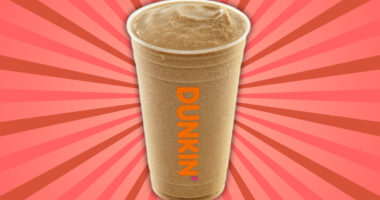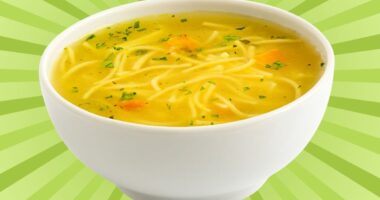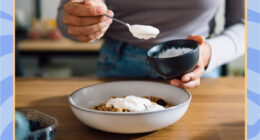Losing weight and shrinking excess belly fat can be a long and exhausting process to actually see results. But looking at a diet that keeps you full and satisfied, while also contributing to shedding some extra pounds sounds like the perfect place to start for long-term changes.
Including more protein in one’s diet can foster weight loss in a number of ways. When combined with exercise, a high intake of protein helps build more lean muscle, and “lean muscle helps to burn more calories throughout the day,” Medical News Today reports.
However, high-protein foods can also “help with weight loss by decreasing hunger and promoting a sense of fullness,” explains Brittany Dunn, MS, RDN, CD, who specializes in sports nutrition and has experience working with and educating athletes through Dunn Nutrition. High-protein diets are extremely effective in weight loss, because “they preserve muscle mass and prevent decreased metabolism,” she says.
A common misconception when it comes to high-protein meals, is that many people want to overcompensate with the intention of losing more body fat, explains Dunn. Many people believe that “food sources of protein are not enough to contribute to a high-protein meal plan and that supplementation is necessary,” when in reality, “whole foods can provide enough and oftentimes, even more protein than expected,” she says.
You should be eating “between 1.6 and 2.2 grams of protein per kilogram of body weight” on a daily basis, if you’re working towards overall weight loss, according to the National Academy of Sports Medicine (NASM).
“Very few Americans consume inadequate amounts of protein,” says Dunn. “However, if you do find yourself struggling to achieve enough protein in your diet, here are some tips: thicken sauces or soups with blended legumes (such as lentils) or [layer] tofu and sweet potato curry over steamed veggies.”
To look into the nitty-gritty of what foods pack the best protein punch, here are 10 high-protein foods to help you reach your weight loss goals and shrink that waist! Then, for more weight loss tips, here are the Eating Habits to Lose Abdominal Fat As You Age, Say Dietitians.
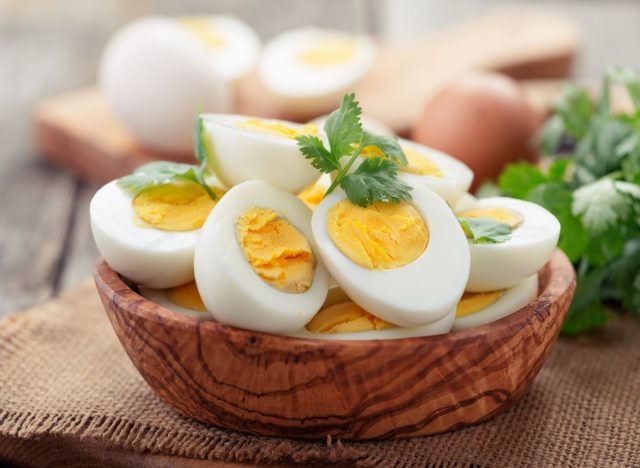

Protein per 1 egg: 6 grams
Eggs can sometimes get a bad rap because of people’s differing opinions on their effect on cholesterol. However, many experts say that eggs are a great source of lean protein to add to your diet.
“Eggs are a great food because they will help you feel full for hours, and they’re also very versatile and inexpensive,” says Lisa Young, PhD, RDN, author of Finally Full, Finally Slim and member of our medical expert advisory board. “You can make an omelet with vegetables, have a hard-boiled egg, or enjoy scrambled eggs for a healthy protein boost.”
Research also backs up the notion that eggs can be an excellent high-protein food for weight loss. One study published in the International Journal of Obesity found that those who ate eggs for breakfast instead of a bagel lost more weight and lowered their BMI.
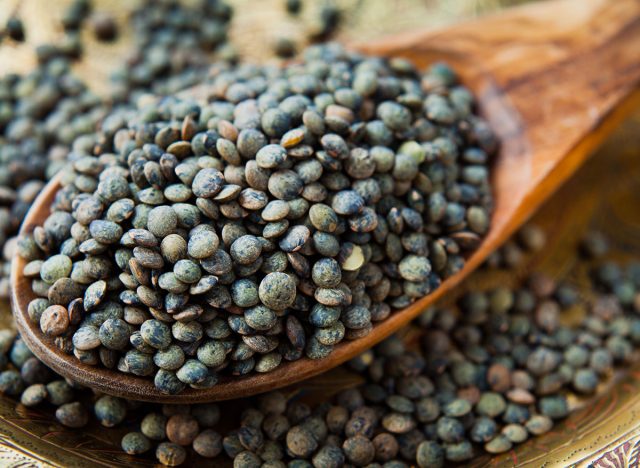

Protein per 1 cup cooked lentils: 18 grams
The best protein sources for weight loss are the ones that also provide a healthy dose of fiber as well. Lentils are a great example of this, and a food that Young suggests incorporating into your daily diet.
“This legume is the perfect food as it is high in both protein and fiber, a true weight loss winner,” says Young. “If you’re looking for ways to eat lentils, you can try a lentil salad or enjoy making a lentil soup.” Or, you can try one of these 31+ Healthy Lentil Recipes.
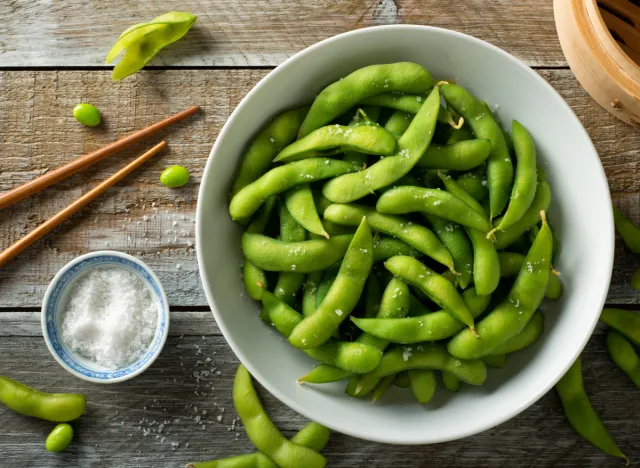

Protein per 1 cup edamame: 18 grams
Edamame is a delicious plant-based protein that easily fits into your weight loss eating plan.
“Edamame is a nutritious legume that is high in protein, vitamins, and minerals, and it can be an excellent snack option, appetizer, or be added to a meal,” says Young. “You can order them at your favorite Japanese restaurant or buy them frozen and add them to a salad or veggie dish for a boost of protein.”
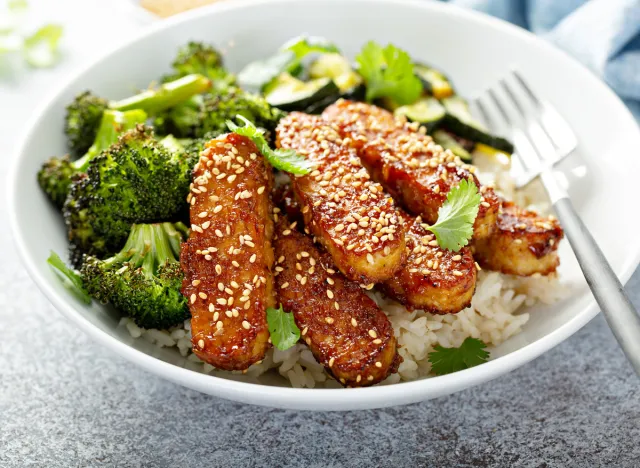

Protein per 1 cup tempeh: 34 grams
Tempeh is a soy-based food that is versatile enough to replace meat in most dishes, and “It’s a satisfying weight-loss friendly food that is fermented and good for the gut,” says Young.
According to an article published in the Journal of Nutrition, those who ate soy-based snacks versus high-fat snacks felt more satiety and satisfaction in between meals. Feeling satiated is a key to weight loss, and it’s an important clue that shows your body is getting enough protein throughout the day.
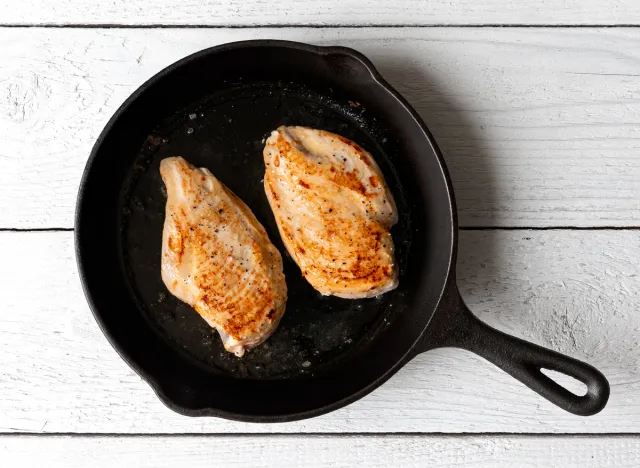

Protein per 1 cup chicken breast: 38 grams
What may seem like an obvious choice, choosing specific meats as a source of protein in your diet can make all the difference when it comes to shedding fat. Lean meats in particular—such as skinless chicken, turkey, pork loin, bison, white flesh fish, salmon, and shrimp—will contain a high level of protein with low calories, healthy fats, and more often than not, less processed ingredients compared to red meat, Medical News Today explains.
When prioritizing eating lean meats, you can “limit the amount of saturated fat [you] consume to less than 10% of calories per day,” according to the U.S. Department of Agriculture (USDA) and the Dietary Guidelines for Americans.
READ RELATED: How to Talk to Your Kids About Your Multiple Sclerosis Diagnosis
Another piece of the puzzle is how you cook your lean meats can help contribute to fat loss. To continue trimming excess weight, The Community Health Center (CHN) says “prepare your meat [by] grilling, broiling, or roasting to lower the amount of saturated fat.”
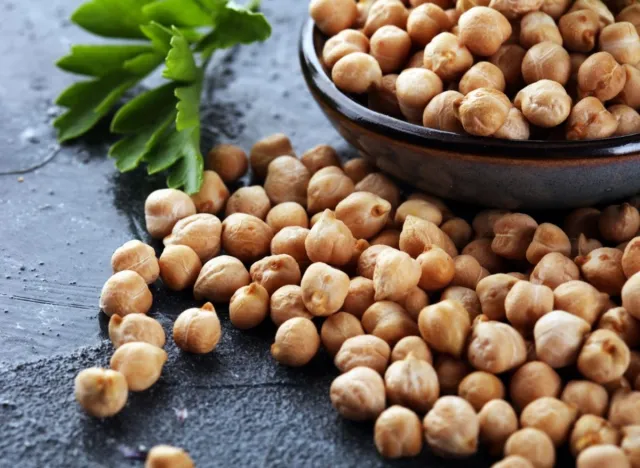

Protein per 1 cup chickpeas: 15 grams
A plant-based source of protein that you can throw into just about any meal for an extra boost — chickpeas.
“Chickpeas are what’s known as a complete protein because they contain all nine essential amino acids,” which play a key role in metabolism and body function, according to Cleveland Clinic. The high protein and fiber contents of chickpeas help to keep you fuller longer, which is important if you’re trying to lose weight and maintain it.
Chickpeas are also a great choice because they are considered a legume, which has the nutrient value of high protein foods as well as vegetables, according to a review in Nutrients. The review also points out that the vast nutrients in chickpeas have major effects on losing weight by controlling the body’s glucose and insulin responses. Both of which play their part in easing digestion and slowing down the absorption of carbohydrates, so you’re full of energy while consuming a low-calorie food.
One way to incorporate chickpeas more into your diet is by adding a “legume-based hummus on sandwiches and wraps,” says Dunn.
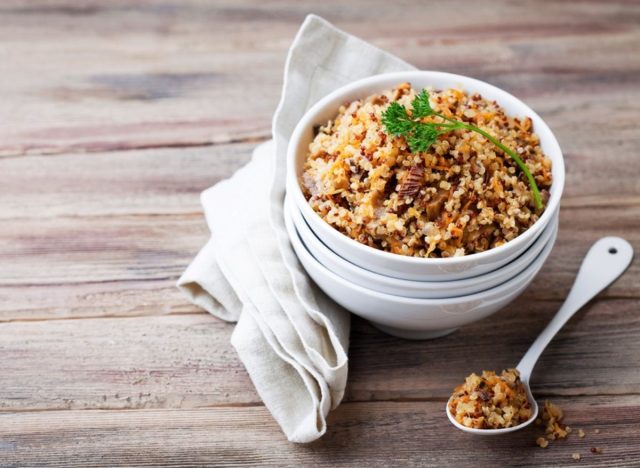

Protein per 1 cup cooked quinoa: 8 grams
Whole-grain foods are another group that has huge rewards in terms of protein. Quinoa for example—can act as a carb-like substitute for rice or pasta—is considered a complete protein, which is made up of the nine of the essential amino acids your body needs. The plant-based protein source will easily fill you up and support your fat loss goals, by contributing to building more muscle and a strong metabolism.
Quercetin and kaempferol, the two flavonoid plant compounds in quinoa, also help with weight loss by protecting your gut cells and supporting strong metabolites. Having strong metabolites will help fuel your metabolism to function efficiently in turning food into energy versus the alternative (fat). But, be careful what you pair with this protein-packed food because combining quinoa with high-calorie and fatty foods could hinder your fat loss journey more than support it.
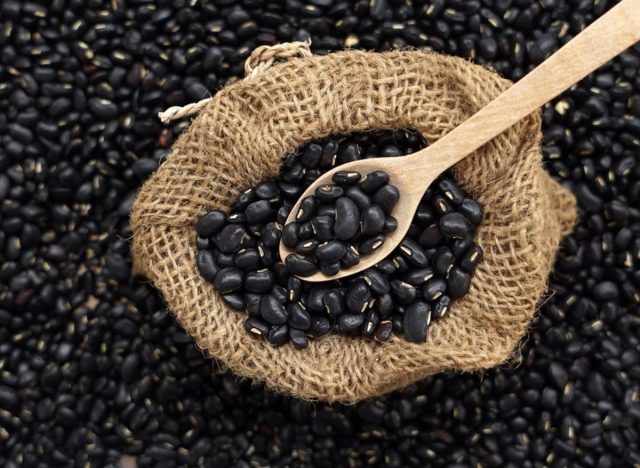

Protein per 1 cup black beans: 15 grams
There’s nothing wrong with enjoying a healthy carb with high protein content, especially when you’re trying to lose fat. Black beans are a complex carbohydrate that is gluten-free and plant-based and sources both high levels of protein and healthy fiber. One study saw major weight loss results after including beans and legumes as a leading source of protein over the span of eight weeks.
The subjects of the study found they had lost significant body fat, reduced their waist circumference, and lowered their blood pressure and total cholesterol. Beans—especially black beans—can help lower the body’s leptin levels, also known as the hormone that regulates the appetite. With a controlled appetite and a body full of healthy protein and fibers, you have a greater chance of losing more fat over time.
Dunn recommends filling up on a protein-packed burrito bowl with black beans, grilled chicken breast, grilled veggies, and salsa. Another meal to help implement more beans in your diet is our Vegetarian Black Bean Omelet Recipe.
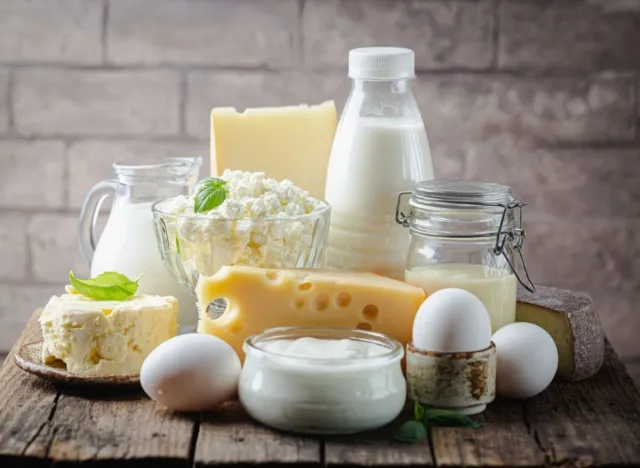

Protein per 7-oz container low-fat Greek yogurt: 20 grams
Dairy products don’t have the best reputation in supplementing a solid fat loss journey, but for many people consuming more dairy on a daily basis can potentially accelerate weight loss. Turning to fat-free milk, certain cheeses (such as cottage cheese), and low-fat Greek yogurt, can support your body’s need for natural dairy-based nutrients (such as calcium) and a high source of protein.
The Journal of the North American Association for the Study of Obesity conducted research on participants in a reduced-calorie diet consuming three to four servings of dairy (in different types) a day, over the span of 24 weeks and many lost a great percentage of total body weight.
The study found that the calcium levels paired with the reasonable protein properties in dairy products contribute greatly to weight loss as they speed up the body’s metabolism and improve natural energy storage.
Looking to sneak in extra protein? Try blending up a well-rounded smoothie with your choice of Greek yogurt, low-fat milk (or a high-protein non-dairy substitute), fruit, and veggies, Dunn says. If you’re not a big smoothie fan, she also recommends topping Greek yogurt with seeds or nuts, nut butter, and hemp hearts.
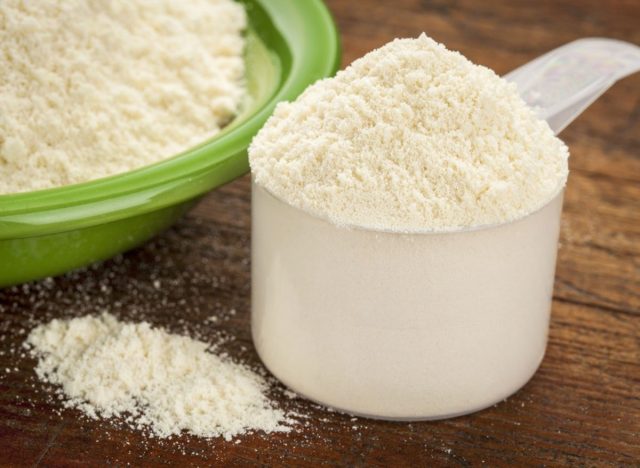

Protein per serving whey protein isolate: 26 grams
Whey protein, in its original form, is mainly found in dairy products like milk and cheese. It’s created during the curdling process of making milk and cheese and contains a total of eight protein groups and nine essential amino acids. The most important group of whey, in terms of fat loss, is the branched chain of amino acids (BCAA’s)—leucine, isoleucine, and valine—which foster significant muscle growth.
It’s highly recommended to consume whey protein for fat loss because it supplements more lean muscle throughout the body (similar to meat), which burns calories at a higher rate than body fat, says Dunn.
There’s a reason why whey protein is one of the most commonly used and researched protein powders on the market. While protein powder isn’t necessarily a food, it’s great to take on the go and can be blended or mixed into so many staple meals and drinks that are already part of your diet.
An original version of this article was published in August 2022. It has since been updated to include more entries.
Source:




